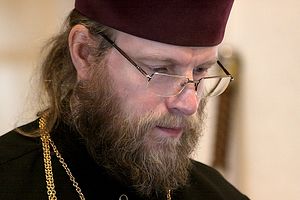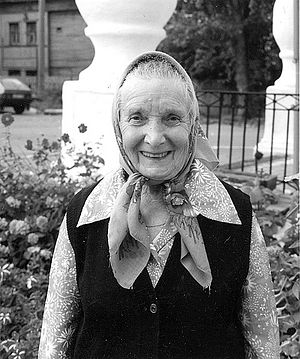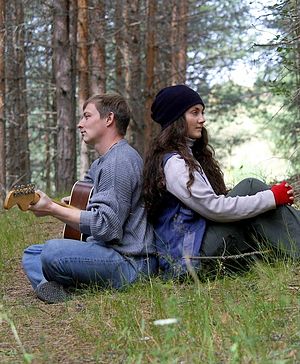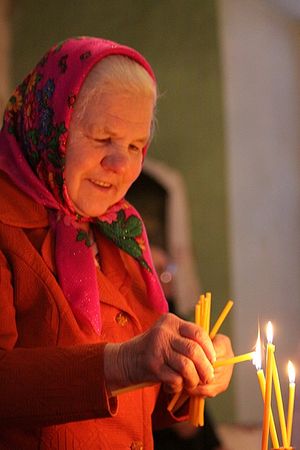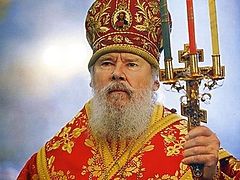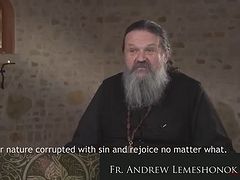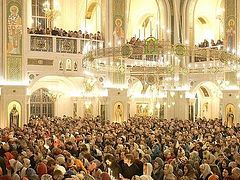Pascha, the feast of the Radiant Resurrection of Christ, has finally arrived. Which Paschal festivities or services have particularly remained in your memory, and what does Pascha mean to you? We posed these questions to Orthodox clergymen and other believers.
It is all sincere, including the joy
Archpriest Igor Sharshakov, rector of St. Nicholas Church in Glinki in the city of Vologda:
As we recall, there are the words of Christ in the Book of Revelation of St. John Theologian that summarize all our hope, our faith in the victory, and our desire to meet with Him again: And I saw a new heaven and a new earth: for the first heaven and the first earth were passed away; and there was no more sea. And I John saw the holy city, new Jerusalem, coming down from God out of heaven, prepared as a bride adorned for her husband. And I heard a great voice out of heaven saying, Behold, the tabernacle of God is with men, and He will dwell with them, and they shall be His people, and God Himself shall be with them, and be their God. And God shall wipe away all tears from their eyes; and there shall be no more death, neither sorrow, nor crying, neither shall there be any more pain: for the former things are passed away. And He that sat upon the throne said, Behold, I make all things new. And He said unto me, Write: for these words are true and faithful. And He said unto me, It is done. I am Alpha and Omega, the beginning and the end. I will give unto him that is athirst of the fountain of the water of life freely. He that overcometh shall inherit all things; and I will be his God, and he shall be My son (Rev. 21:1-7).
At Pascha we read these words with absolutely different eyes: the Resurrection of Christ allows us to touch that wondrous world which in fact is our true home, our true motherland, something we long for throughout our lives, whether consciously or unconsciously. Our suffering due to lack of justice, kindness and love in this sinful world is caused by our awareness and feeling that we belong to the Kingdom of Christ and are unable to draw nearer to our paternal abode on our own. And now we have a marvelous “guide” and gift from God that removes all obstacles on our way towards Him: Christ Is Risen!
What are my dominant emotions and feelings in these days? I think it is a quiet yet strong, profound joy of being at home. I don’t want to spoil this stream of joy and triumph of salvation by vain, “stock” rhapsodies and exalted speeches, coupled with eating Easter cakes and eggs, meat and milk which are “at last allowed by the Church”.
Behold, I make all things new. I can see “all things new” more clearly, when I come to church in the morning during Bright Week following a respite after the strenuous period of Holy Week and the midnight Paschal Liturgy. There is a pure light and peace in the church; the people that are standing there have come to experience this quiet joy and not “dropped in by accident”. All is sincere, including joy. This kind of joy reminds you of your true fatherland, namely the Heavenly Kingdom. This is our citizenship in heaven (an allusion to Phil. 3:20) that no one can take away from us.
We used jars with sand instead of candle holders, yet our souls were filled with light
Nina Dmitrievna Lebedeva, a parishioner of the Church of the Protecting Veil of the Mother of God “at the Market”, Vologda:
My soul tasted light and purity on Pascha! All was sincere not oppressive. When our church celebrated its first Pascha after its reopening in 1990, the whole congregation would gather in the church basement after the Liturgy, enjoy Easter cakes and laugh. In contrast with our days, at that time we were poor but united. I recall how some brought food with them, someone brought a table cloth, and one parishioner gave the church a big chest which we first used as a seat and then according to its intended purpose. We used jars with sand instead of candle holders, yet our souls were filled with light.
When the church acquired a piano, our Fr. Vasily of blessed memory would always play some moving compositions that made us cry or laugh. Once Vladyka Michael [in all probability: Archbishop Michael [Mudyugin: 1912-2000) who ruled the Diocese of Vologda and Veliky Ustyug between 1979 and 1993] himself came to our church to greet us on Pascha. He was so easy to talk to, well-mannered, affectionate and close to people. At the same time, he was serious, and not just playing at being a serious man.
We Christians then lived in friendship and concord, as opposed to our times. Even during the Second World War we lived in peace and harmony with each other: Then we would share every crust of bread equally among us, whereas now we are ready to grab our neighbor’s last morsel of food… Today we are trying to find happiness in money and are traveling extensively to Israel and Italy, Greece and Finland… We call ourselves “pilgrims”, while we seem to have forgotten the true “Holy Land”—that is, our souls and our neighbors. With all this, can we really talk about light and purity?
Therefore, every year on Pascha I pray for the return of light, integrity and purity into our souls.
The happiness that you experience over and over again
Maria Andreevna Minaeva, a parishioner of St. Lazarus Church:
My first Pascha was in 1993, when my newly-ordained father, Priest Andrei Pylev, was sent to the Church of the Protection of the Mother of God near Kirillov [a town in the Vologda region, where the monastery of St. Kirill of White Lake is located].
On the eve of the Palm Sunday my mother took me to Kirillov by bus (it should be said that I grew up in an urban environment). Fr. Andrei met us and we walked all five miles to the Church of the Holy Protection. All seemed not only very new for me—if anything, I felt as if I were in some wonderful world from a fairy tale. No wonder if you are a little girl of five! “Why is the big city so dark and the countryside is so pure and gleaming white?” I thought. I was walking, holding onto my parents’ hands, until the Church of the Protection sprung up around the bend. That unusual feeling did not fade away with time. The country road curved; it was beset by woods with a lake beside it. All of a sudden a slender white bell-tower with a blue dome came in sight. I love this church and it’s partly because it “appears” in this unique way. It is like a miracle every time I come here.
At the church we were welcomed by the churchwarden Anna Ivanovna Vinogradova. She lived in a tiny watchbox by the church and her bed with curtains really amazed me. Like the adults, I was given a hot fish soup to eat.
I was walking around the church through Holy Week as though it were a cave of treasures. I simply couldn’t take in all the wonders of the church! A dimly lit church with numerous aisles and nooks, with countless icons hidden in them. The Archangel Raphael, mysteriously showing us the way; the gleaming centuries-old “aristocratic” icon lamps, adorned with jewels (nobody then could make me believe that those stones were not precious); and the aromatic smell of old, huge, yellowed books (with brownish “age spots” and tarnished gold) in the choir that had been published in the tsar’s reign…
But during the Paschal night the entire church interior, including every mysterious nook, was brightened up and filled with the radiant light. The winter church was packed with the merry Kirillov residents. Small coins were jingling in the church store, the candles were sputtering, and I could hardly keep my eyes open.
This was followed by a procession of the cross; the “dark” cemetery was near (but it did not scare me), with the “fresh” spring lake behind it. And it was then that I first heard my father’s rather low voice, singing the most long-awaited words in the whole liturgical year. And I have kept that moment of true happiness in my heart ever since.
The main female character of one short story by Alexei Remizov (1877-1957; an influential Russian writer who after the Revolution emigrated to Paris; he wrote in a distinctive archaic style, mainly based on the literature and oral tradition of the Russia before Peter I) lived “from Pascha to Pascha”. In my view, it is a very precise definition. The Paschal night is the happiness that the Lord allows you to experience over and over again. And I first experienced it at the Church of the Holy Protection back in 1993.
A feast with tears
Nina Fyodorovna Panicheva, a parishioner of the Church of St. Anthony the Great in the village of Peski, the Vologda district of the Vologda region:
I always cry on Pascha. Maybe it’s because I am growing old. And I cry with joy: Christ trampled down death and bestowed life on us, so I cannot help but rejoice! In the Soviet era I would secretly go to Vologda for the Paschal night where my friend and I would attend the midnight Liturgy. I remember that the police often cordoned off the cathedral and not everyone was allowed inside. Later I became a parishioner of the Church of the Holy Protection “at the Market”. Services there were so impressive, and its priest, Fr. Vasily Pavlov, was so wonderful.
In time the fish factory in Peski gave its building to the believers. But my heart aches because the church holds services once a month, so we have this joy only once a month. I wish we could worship during Bright Week, not only on the day of Pascha. But very few people attend. There are just a handful of permanent residents in the village, and summer residents (who spend only their vacations here) don’t care at all. But we ourselves are to blame: We brought up our children this way, they are now indifferent to God. Forgive us, O Lord! Help us reform! Thou Who rose from the dead! Please, raise us as well!
With God all things are possible (Mt. 19:26)
Michael Nekrasov, an Orthodox believer from Vologda:
I was baptized in the Soviet era when I was in the sixth grade at school. On that day my mother and grandmother asked for me to be excused from classes and we went to church… So I was standing in the church with a broken right arm. And it was time for me to make the sign of the cross for the first time in my life. I looked at my sick arm which was in a plaster cast and decided to do it with my left hand. But the priest saw it and said, “You shouldn’t cross yourself with your left hand. Ignore the plaster, the Lord will heal your arm!”
And so I made the sign of the cross with my sick right arm. The priest said to me, “You are Michael. So the Archangel Michael will always be with you.” Glory be to God! And every time I celebrate Pascha at church I feel the power, the might, the goodness of God and His love towards us.
The Gospel in music
Deacon Kirill Kiselev, the Church of the Resurrection of Christ in Cherepovets:
One Paschal service at the Moscow Sretensky Monastery particularly stuck in my memory. It was in 2005. I was studying at the Sretensky Theological Seminary at that time. The exact year is not so important because Paschal celebrations at Sretensky Monastery are indescribably solemn, triumphant and very memorable every year. During Paschal services there I came to realize that the joy of the Resurrection of the Lord extends to the whole universe, which in all its grandeur and diversity has been glorifying its Creator.
But why was it that way? First and foremost, the singing of Sretensky Monastery’s choir had a striking effect. It was a sort of “Gospel in music”! It was a resounding, confident, all-triumphant and incredibly beautiful choral preaching, accessible and clear to everybody, even to someone who has come to the church for the first time. I can even stop here because the memories of that Paschal singing will remain with me forever.
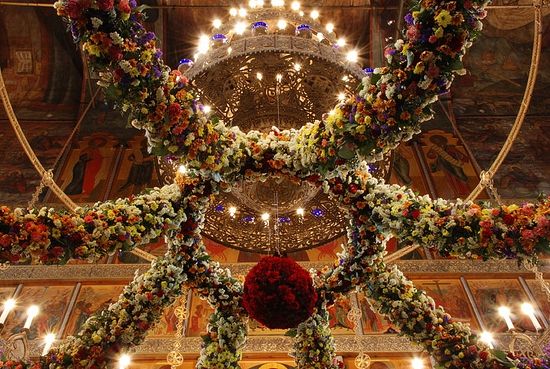 Paschal decorations of the area beneath the dome of the Moscow Sretensky Monastery. Photo by A. Pospelov / Pravoslavie.ru.
Paschal decorations of the area beneath the dome of the Moscow Sretensky Monastery. Photo by A. Pospelov / Pravoslavie.ru. But I cannot help but remark how splendid the church looked both at that Paschal night and the ensuing days of Bright Week. The iconostasis, the area under the church dome, candles of the clergy – all of this was decorated with flowers. The fragrance of marvelous roses filled the church and mixed with the aromas of various kinds of frankincense.
Both the singing and the decorations during the Paschal Liturgy of this church made me and everybody else feel exactly what the ambassadors of the Holy Equal-to-the-Apostles Prince Vladimir felt at the churches of Greece: “We didn’t know whether we were in heaven or on earth!”
And that is not all. When the Liturgy was over and the parishioners began to leave, they were welcomed by a ringing of bells and given treats. Tables were lined up in the monastery’s yard, and seminary students offered each worshipper a small disposable plate with a piece of Pascha cake, a piece of the Russian paskha curd cheese, bread and butter, and an Easter egg on it. In addition, good-natured seminary students gave a cup of cocoa to each guest. Everybody could enjoy these treats at the table unhurriedly.
And when the bells stopped ringing, the night monastery’s yard was suddenly lit up by colorful fireworks. Revolving “fire wheels”, a “fire cascade”, skyrockets and petards and, lastly, two huge luminous letters “XB” (in Russian Cyrillic the abbreviation means the first letters of “Christ Is Risen”). As a result everybody was enthralled by the event. I am not sure if I was breathing during the spectacle or not, but as soon as the letters went out I breathed out noisily and discovered that I was still standing in the monastery’s yard.
I celebrated the feast of the Radiant Resurrection of Christ in different churches. But it was this Pascha that I’d like to call “rejoicing”, that stuck in my memory forever.

